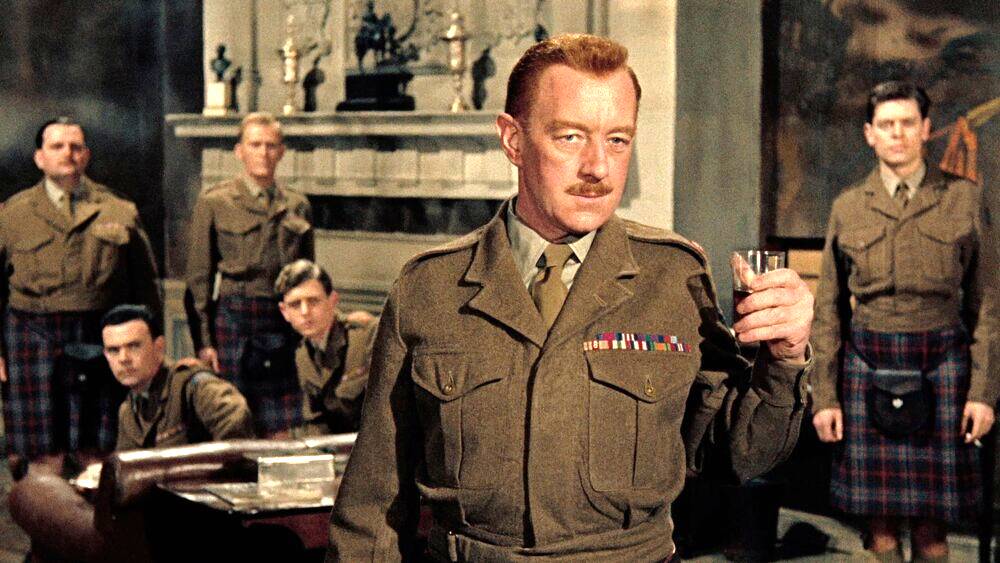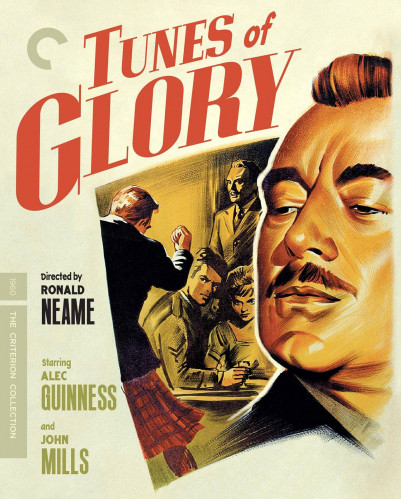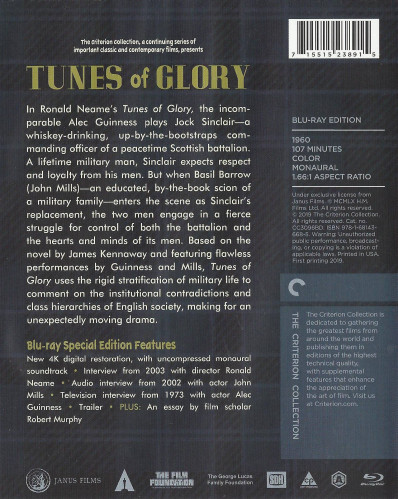TUNES OF GLORY [1960 / 2019] [Blu-ray] [The Criterion Collection] [USA Release]
Clash of Wills, Pride and Ambition, That Exploded into a Personal War!
In Ronald Neame’s ‘TUNES OF GLORY,’ the incomparable Sir Alec Guinness plays Major Jock Sinclair, D.S.O., M.M. — a whiskey-drinking, up-by-the-bootstraps commanding officer of a peacetime Scottish battalion. A lifetime military man, Major Jock Sinclair, D.S.O., M.M. who expects respect and loyalty from his men. But when Lieutenant Colonel Basil Barrow [Sir John Mills] — an educated, by-the-book scion of a military family — enters the scene as Major Jock Sinclair, D.S.O., M.M.’s replacement, the two men engage in a fierce struggle for control of both the battalion and the hearts and minds of its men. Based on the novel by James Kennaway and featuring flawless performances by Sir Alec Guinness and Sir John Mills. ‘TUNES OF GLORY’ uses the rigid stratification of military life to comment on the institutional contradictions and class hierarchies of English society, making for an unexpectedly moving drama.
The Criterion Collection is dedicated to gathering the greatest films from around the world and publishing them in editions of the highest technical quality. With supplemental features that enhance the appreciation of the art of film.
FILM FACT No.1: Awards and Nominations: 1960 Venice Film Festival: Win: Volpi Cup: Best Actor for John Mills. Nominated: Golden Lion Award: Ronald Neame. 1961 Academy Awards®: Nominated: Best Writing, Screenplay Based on Material from Another Medium for James Kennaway. 1961 BAFTA Film Awards: Nominated: Best British Actor for Alec Guinness. Best British Actor for John Mills. Best British Film for Ronald Neame. Best British Screenplay for James Kennaway. Best Film from any Source for Ronald Neame.
FILM FACT No.2: Writer James Kennaway served with the Gordon Highlanders, and the title refers to the bagpiping that accompanies every important action of the battalion. The original pipe music was composed by Malcolm Arnold, who also wrote the music for ‘The Bridge on the River Kwai.’ The film was generally well received by critics, the acting in particular garnering praise. The film was initially to be made at Ealing Studios, with Michael Relph as producer and Jack Hawkins playing Sinclair. At the time that it was at Ealing, Kenneth Tynan, then working as a script reader, criticized the first draft screenplay as having “too much army-worship in it.” That view was shared by director Alexander Mackendrick. By the time James Kennaway rewrote the script, Ealing Studios had lost interest and Jack Hawkins was no longer available. The film was then picked up by the independent producer Colin Lesslie, who interested John Mills in the project. Accounts differ as to how the leading roles were cast. John Mills wrote that he and Alec Guinness “tossed for it,” while Alec Guinness recalled that he had originally been offered the role of Lieutenant Colonel Basil Barrow but preferred Major Jock Sinclair, DSO, MM. The role of Lieutenant Colonel Basil Barrow might have been too close to that of Colonel Nicholson in ‘The Bridge on the River Kwai.’ Sinclair has been described as “anti-Nicholson.” ‘TUNES OF GLORY,’ was shot at Shepperton Studios in London. The film's sets were designed by the art director Wilfred Shingleton. Establishing location shots were done at Stirling Castle in Stirling, Scotland. Stirling Castle is the Regimental Headquarters of the Argyll and Sutherland Highlanders but in fact James Kennaway served with the Gordon Highlanders. Although the production was initially offered broad co-operation to film within the castle from the commanding officer there, as long as it didn't disrupt the regiment's [Argyll's] routine, after seeing a lurid paperback cover for James Kennaway's book, that co-operation evaporated, and the production was only allowed to shoot distant exterior shots of the castle. The film ‘TUNES OF GLORY’ was the official British entry at the 1960 Venice Film Festival, and John Mills won the Best Actor award there. That same year the film was named “Best Foreign Film” by the Hollywood Foreign Press Association.
Cast: Sir Alec Guinness, Sir John Mills, Dennis Price, Kay Walsh, John Fraser, Susannah York, Gordon Jackson, Duncan Macrae, Percy Herbert, Allan Cuthbertson, Paul Whitsun-Jones, Gerald Harper, Richard Leech, Peter McEnery, Keith Faulkner, Angus Lennie, John Harvey, Bryan Hulme, Andrew Keir, Eric Woodburn, Andrew Downie, Jameson Clark, Lockwood West, Gwen Nelson, Robert Arnold, Richard Rudd, John Barcroft, James Copeland, Mark Burns, John Bown, William Young, David Webb, William Marlowe, Barry Steele, Keith Banks, Ray Austin (uncredited), Redmond Bailey (uncredited), Alan Beaton (uncredited), Wallace Bosco (uncredited), Eddie Boyce (uncredited), Donald Douglas (uncredited), Hugh Elton (uncredited), Ernest Fennemore (uncredited), Fred Haggerty (uncredited), Patrick Halpin (uncredited), Walter Henry (uncredited), Joan Hickson (uncredited), Frazer Hines (uncredited), Anne Leon (uncredited), Rick Lester (uncredited), Fulton Mackay (uncredited), John Mackenzie (uncredited), Cecil Paul (uncredited), and Pat Ryan (uncredited)
Director: Ronald Neame
Producers: Albert Fennell and Colin Lesslie
Screenplay: James Kennaway (based on the novel/screenplay)
Composer: Malcolm Arnold
Costume Design: Joan Ellacott (uncredited)
Cinematography: Arthur Ibbetson, B.S.C. (Director of Photography)
Image Resolution: 1080p (Technicolor)
Aspect Ratio: 1.66:1 (Anamorphic)
Audio: English: 1.0 LPCM Mono Audio
English: 1.0 Dolby Digital Mono Audio
Subtitles: English
Running Time: 107 minutes
Region: Region A/1
Number of discs: 1
Studio: UNITED ARTISTS / JANUS FILMS / The Criterion Collection
Andrew’s Blu-ray Review: ‘TUNES OF GLORY’ [1960] directed by Ronald Neame, which was widely admired when the film was first released, and has subsequently kept a low profile. This says more about critical attitudes and British film culture than it does about the quality of the movie. Made in Technicolor when most British films were still made in black and white and concerned with the affairs of an exclusive Scottish military caste at a time when British cinema was beginning to investigate the unexplored hinterland of working-class life, it seemed to fit into no tradition, no genre, and thus became unjustly neglected. However, it is this film’s uniqueness that makes it all the more fascinating.
‘TUNES OF GLORY’ is an intense portrayal of leadership, discipline and reintegration issues common to soldiers and units of any conflict, army, or time period. It could serve as an effective catalyst to discuss any or all of the challenges the film presents, perhaps as part of a unit’s professional development programme.
‘TUNES OF GLORY’ is based closely on a popular first novel by James Kennaway — where we find Major Jock Sinclair, D.S.O., M.M. [Sir Alec Guinness], who plays an angry and blustering Scottish officer who may also be an alcoholic, who is at least is a problem drinker and shows many signs of alcoholism. The film begins with this popular officer throwing a farewell party, of sorts, with the men in his command. It seems that Sir Alec Guinness was given temporary command but a replacement Lieutenant Colonel Basil Barrow [Sir John Mills] is due to arrive shortly – dashing Sir Alec Guinness' hopes for this position becoming permanent.
Rough-necked and uneducated Major Jock Sinclair, D.S.O., M.M.has fought his way through the ranks, and despite the love of hard drink and the odd Highland fling, has proved himself in the very heat of battle. So much so that he has been made Acting Colonel of an (unnamed) Scottish regiment.
‘TUNES OF GLORY’ shows us Sir Alec Guinness’ character is so very flawed and petty, he does much to try to undermine the new Lieutenant Colonel Basil Barrow. In particular, Sir John Mills is a “by the book” sort of officer and Sir Alec Guinness ignores changes Sir John Mills orders – and by example, derision and a lack of respect for Sir John Mills spread through the ranks. Instead of behaving like officers and gentlemen, the men behave like this is some sort of popularity contest and they show contempt for their new leader. None of this is helped by Sir Alec Guinness' drinking, as it gets him in trouble and creates serious problems for the regiment.
While Sir John Mills, as usual, does a great job in the film playing a man who is suffering from Post-traumatic Stress Disorder, the film is definitely Sir Alec Guinness’s film and his boorish character is a great example of him once again immersing himself into a character and the way he responds to the tragedy near the end of the film gives the character great depth and a bit of sympathy – something you needed to make this a really stand-out film.
Ronald Neame had first come to prominence as a cinematographer shooting among many other films, ‘In Which We Serve.’ Ronald Neame made the transition to directing in 1947 with the atmospheric thriller ‘Take My Life,’ going on to make several notable films in the fifties, including a clever, convincing Second World War film, ‘The Man Who Never Was’ [1956], and, immediately preceding ‘TUNES OF GLORY,’ ‘The Horse’s Mouth’ [1958], with Alec Guinness displaying his virtuosity as the artist Gulley Jimson.
Inevitably, the film ‘TUNES OF GLORY,’ stands or falls on the performances of Sir John Mills and Sir Alec Guinness. It was Sir John Mills who won the prize for best actor at the Venice Film Festival that year, and one can understand why. A character who could have been a neurotic bore, and one we would have been glad to see the back of, grows in our affections as Sir John Mills gradually reveals the vulnerable man within the stiff military dummy. In retrospect, though, Sir Alec Guinness has the more difficult task.
In the novel, it is apparent enough that Major Jock Sinclair, D.S.O., M.M.’s arrogant toast — “Whiskey, for the gentlemen who like it. And for the gentlemen who don’t like it, whiskey”—is a drunkard’s boast. James Kennaway captures superbly the flamboyance, the cunning, and the manipulation of the habitual heavy drinker. But the on-screen portrayal of such a man can easily degenerate into caricature. Alec Guinness — who rightly regarded his representation of Jock Sinclair as one of his best performances — makes his character sway between being dangerous and being pathetic so that we, like Lieutenant Colonel Basil Barrow [John Mills], never quite know what to make of him.
‘TUNES OF GLORY’ is a story of soldiers in a troubled unit and is timeless, and the performances by Sir Alec Guinness and Sir John Mills are among the best of their long acting careers. The relationships, personalities, and tensions within the unit will be familiar to veterans of any army. The film’s lessons are as in trenchant today as they were when ‘TUNES OF GLORY’ was released.
TUNES OF GLORY MUSIC TRACK LIST
THE BLACK BEAR (Traditional) (uncredited) (Arranged by Malcolm Arnold)
THE SKYE BOAT SONG (uncredited) (Lyrics by Sir Harold Boulton) (Tune collected by Annie MacLeod aka Lady Wilson) [Whistled by Jock Sinclair]
SCOTLAND THE BRAVE (Traditional) (uncredited)
A GORDON FOR ME (uncredited) (Lyrics by Robert Wilson) (Music by Robert Wilson) [Sung by Jock Sinclair and other officers in the mess]
THE DUKE OF PERTH (Traditional) (uncredited)
THE FLOWERS OF THE FOREST (Traditional) (uncredited)
* * * * *
Blu-ray Image Quality – The Criterion Collection in association with United Artists and JANUS FILMS presents us the film ‘TUNES OF GLORY’ with yet another fine treatment from The Criterion Collection, who have restored another classic film with a really excellent picture quality. This project is another success, though some flaws remain. The main issue is a line that appears the film’s close, which seems to have been unavoidable. I’ve seen worse and been able to overlook it however, so I can’t see getting that upset. The rest of the print looks terrific too, with minimal debris and grain to see, so the image is quite remarkable. The visuals have more depth than expected also, which ensures the small touches are preserved. Aside from the brief presence of the line I mentioned, this is quite simply a magnificent presentation. The new 4k digital restoration was undertaken by the Academy Film Archive and The Film Foundation in collaboration with JANUS FILMS and the Museum of Modern Art. Restoration funding was provided by the George Lucas Family Foundation. A new digital transfer was created on a DFT Scanity film scanner from the 35mm original camera negative.
Blu-ray Audio Quality – The Criterion Collection in association with United Artists and JANUS FILMS brings us the film ‘TUNES OF GLORY’ where the soundtrack has also been cleaned up for this release, so the mono option sounds as good as can be expected. A few pops and worn moments can still be heard, but this is as good as you could demand for the elements involved. The accents are tough to understand at times, but that is expected and the soundtrack is not to blame in the least. I found dialogue to be clean and crisp at all times, with no volume or balance issues to mention. So while not a memorable audio experience, this is an adequate and well-crafted soundtrack. The original monaural soundtrack was restored from an optical soundtrack print by John Polito of Audio Mechanics in Burback, California.
* * * * *
Blu-ray Special Features and Extras:
Newly restored 4K digital transfer, with uncompressed monaural soundtrack on the Blu-ray.
Special Feature: Ronald Neame [2003] [1080i] [1.37:1] [23:23] With this featurette, we get to view an archival video interview with director Ronald Neame and was recorded for The Criterion Collection in Los Angeles in October 2002. Director Ronald Neame recalls how he was offered to direct ‘TUNES OF GLORY’ and what it was like to work with its stars. There are also some very interesting observations about the nature of the conflict that is documented in the film as well as Sir Alec Guinness' transformation during the production process.
Special Feature: John Mills [Audio only] [2002] [1080i] [1.78:1] [14:27] ] With this featurette, and in April 2002, actor Sir John Mills granted The Criterion Collection a brief audio interview about the film ‘TUNES OF GLORY,’ which was conducted by documentary filmmaker Nigel Algar. The interview conversation was recorded at Sir John Mills home in England. Sir John Mills explains what convinced him to play the character of Lieutenant Colonel Basil Barrow in ‘TUNES OF GLORY’ and discusses the blending of drama and comedy the gives the film its identity. You get to view one still image of Sir John Mills in his uniform he appeared in the ‘TUNES OF GLORY’ film.
Special Feature: Alec Guinness [1973] [1080i] [1.37:1] [15:22] With this featurette, we get to view an archival video interview, where Sir Alec Guinness discusses the evolution of his acting career in movies and theatre. The interview originally aired on the BBC television programme “Film Extra” in 1973. Interviewer: Tony Bilbow.
Special Feature: Theatrical Trailer [1960] [1080p] [1.66:1] [3:01] This is the Original Theatrical Trailer for the film ‘TUNES OF GLORY.’
PLUS: An essay entitled “RANKS DIVIDED” by film scholar Robert Murphy and is a deep, perceptive dive into the films characters and themes.
BONUS: The ‘TUNES OF GLORY’ Blu-ray Cover is by Eric Skillman based on an original theatrical poster
Finally, ‘TUNES OF GLORY’ [1960] is a standout film with its look at conflict during a time of peace, and feels timeless in its exploration of social themes and class. Alec Guinness and John Mills are magnificent and well deserving of your attention, as is this release from The Criterion Collection. In his 2003 autobiography, “Straight from the Horse’s Mouth,” Ronald Neame tells us that “of all my films, ‘TUNES OF GLORY’ is the one film he cared about the most. Looking at it today, I find the performances and the production not dated in any way. It is a story that will always have something to say to each generation — a satisfying and rewarding experience.” It is a sentiment that I suspect most viewers of the film would endorse. Highly Recommended!
Andrew C. Miller – Your Ultimate No.1 Film Aficionado
Le Cinema Paradiso
United Kingdom



